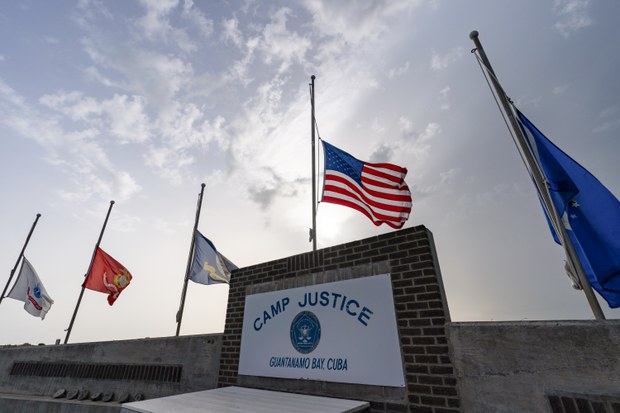Guantanamo court sets pre-trial hearing for suspects in Bali bombings
2022.08.22
Washington
 Camp Justice in Guantanamo Bay Naval Base, Cuba, is seen in this photo reviewed by U.S. military officials, Aug. 29, 2021.
Camp Justice in Guantanamo Bay Naval Base, Cuba, is seen in this photo reviewed by U.S. military officials, Aug. 29, 2021.
An Indonesian and two Malaysians who have been incarcerated for more than 15 years at Guantanamo Bay, Cuba, on terrorism charges linked to the 2002 Bali bombings are scheduled to appear in court for a pre-trial hearing in late October, U.S. defense officials announced Monday.
If all goes to schedule, Indonesian Encep Nurjaman (also known as Hambali), and Malaysians Nazir Bin Lep and Farik Bin Amin will appear in a military court at Guantanamo from Oct. 31 to Nov. 4 – in what would be only their second court appearance since their arrests in Thailand in 2003. Their court hearing will take place a little more than two weeks after the 20th anniversary of the Bali bombings – the deadliest terrorist attack in Indonesia’s history.
When the three were arrested 19 years ago, they were sent to CIA black sites, where they were tortured, before being transferred to the U.S. military prison in Cuba in 2006, according to a 2014 U.S. Senate report.
The military court and the U.S. Department of Defense did not release details of the planned hearing for the three, “all of whom have been charged jointly in connection with their alleged roles in the 2002 and 2003 bombings in Indonesia,” in a notice to media interested in covering the proceedings at the U.S. Naval Base in Guantanamo.
The trio first appeared at a military court there during their arraignment in August 2021. At the time, their lawyers lodged a protest before military Judge Hayes Larsen about the poor quality of the audio translations their clients were receiving.
Referred to as “alien unprivileged enemy belligerents” in some court documents, Nurjaman, bin Lep and bin Amin face charges related to twin bombings that killed 202 people in Bali in October 2002 and a bombing at the J.W. Marriott hotel in Jakarta in 2003. None of the men entered a plea to the charges against them following their arraignment last August.
In an effort to improve translations, Larsen ordered military prosecutors to hire and assign qualified interpreters for any upcoming court action.
“The defense teams all indicated they need assurances in order to be able to use their government-provided defense interpreters for attorney-client communications,” Larsen wrote in a January court filing ahead of what was supposed to be a pre-trial hearing in late February.
Responding to the judge, prosecutors said in a Feb. 1 filing that they were seeking to hire four full-time interpreters, two for each language.
“Because of the uncertain timeline involved in obtaining clearances for new hires who do not have clearances, it is too speculative to estimate when fully cleared full-time interpreters will be available to assist the commission,” they wrote.
James Hodes, who represents Hambali, blasted the prosecutors, noting they had 18 years to prepare their case against his client, which included hiring “qualified commission interpreters.”
“This is what you are tasked with and this is what you have failed to provide,” he told BenarNews earlier this year while calling the lack of interpreters a “huge obstacle for a fair trial.”
Hodes could not immediately be reached on Monday for comment on the proposed court dates.
Bomber up for parole in Indonesia
The announcement by the Pentagon comes days after Indonesia’s government said that Umar Patek, who was convicted in an Indonesian court in 2012 for his role in the Bali bombings and sentenced to more than 20 years in prison there, could soon be released on parole. That announcement angered Australia’s government officials because 88 of its citizens were killed in that attack.
Because Umar received a five-month sentence reduction on Independence Day, Aug. 17, on top of previous reductions, he could be freed in days because he had served enough time to qualify for parole, according to officials. If parole is denied, he could remain jailed until 2029, according to media reports.
“We hope, with his release, we can involve Umar Patek more on the deradicalization programs,” Akhmad Nurwahid, director of prevention at the National Counter-Terrorism Agency, told BenarNews last week.
Umar’s ideology has been relatively moderate since he pledged allegiance to the Republic of Indonesia at his prison in Sidoharjo, East Java, Akhmad said.
Dyah Ayu Kartika, an analyst with the Institute for Policy Analysis of Conflict, a Jakarta-based think-tank specializing in researching terrorism, said that while in prison, Umar has partnered with the government in the de-radicalization program.
“He has been helped a lot by the (Indonesian) government, including making his (then Filipino) wife an Indonesian citizen. This is also an essential factor in his de-radicalization,” Dyah said.
Kusumasari Ayuningtyas in Klaten, Indonesia, contributed to this report.







